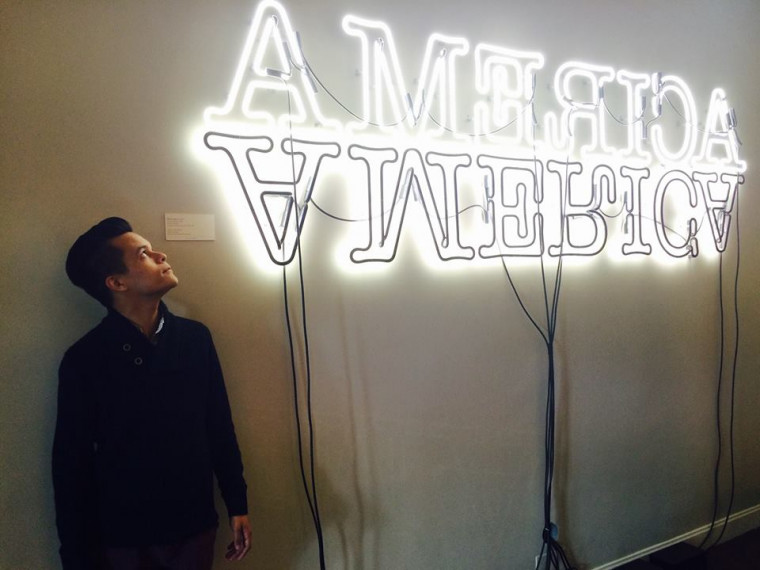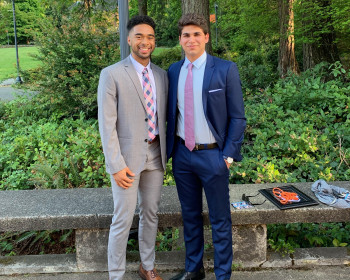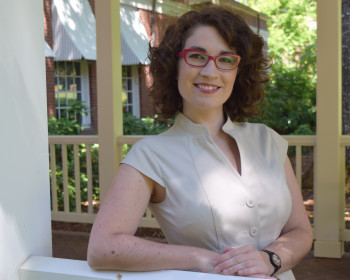Loren Naldoza
Open gallery

What have you been doing since Lewis & Clark? How did you become connected to this opportunity?
I am currently living in Madrid working as a Fulbright grantee for the 2015-2016 academic year. Over the four years I had spent at Lewis & Clark, I had known of its existence, but wasn’t compelled to apply for it until my senior year, when I sat down with a few of my professors in both of my departments (the other being Hispanic Studies), who all urged me to apply. And am I glad that I listened to them! So far, I have only been in Spain for a few months, however I can say without doubt that the Fulbright experience is saturated with new opportunities, connections, and challenges that only help me grow and prepare for any future challenges that I take on. This last week, I was invited by the US Ambassador to Spain James Costos to his official residence in order to discuss cultural connections and dichotomies between the two nations through the medium of the arts. Being part of such a program empowers me to grow beyond Lewis & Clark, and beyond the borders of the United States.
Over the summer before Fulbright, I worked at the New Seasons in Sellwood, mostly for its air conditioning that I lacked in my own home. It was swell.
How has your Lewis & Clark education contributed to your experiences? What has been the “real-world” application of your economics degree?
Lewis & Clark is really the ONLY reason why my experiences in the last five years have been so invaluable, unforgettable, and unique in description. This institution taught me to look at the world in various shades of perspectives and put everything I read or see under scrutiny. During my third year, LC shipped me off abroad to a country that I loved so much, that I’m writing to you now from that same country. These four years are finally wrapped up with the opportunity to write a unique piece of research under the close but empowering guidance of a professor who genuinely cares that I end up with a product that I can be proud of writing.
The extent to which my economics degree is applied to the “real world” takes many forms. It hits close to home (that is, my home of Portland, Oregon) through the form of my senior thesis, in which I measured the effect of our urban growth boundary policy on housing prices within the Portland metropolitan statistical area. My degree literally crosses borders in my Fulbright social project, now that I am currently looking into the potential effects of the secession of Catalonia (a workhorse of productivity and economic capital of the Iberian Peninsula) from Spain, especially now in a time of economic fragility. I am also currently teaching a variation of principles of economics/social studies in a secondary education institute (IES) in Madrid.
What are your plans for the future? How did that vision evolve throughout your college career?
Beyond Fulbright, which is a year-long commitment, I plan to temporarily return to Portland and then continue my studies at a graduate level in economics, which is a relatively new update in my future prospects. When I graduated in May, despite how excellent my four years were, I feel like there is so much more to my future studies in economics. I have no prospects for a specific job of interest, but I mostly attribute that to my desire to supplement my experience at LC with another degree.
What was your favorite class, economics or otherwise, during your time at Lewis & Clark? Why?
That’s hard. I would definitely choose between three: Either Cliff Bekar’s Senior Seminar or Game Theory section, or Art O’Sullivan’s course in Urban Economics , all for different reasons. Senior Seminar gave me the freedom to pursue a topic that interested me personally, all the while using everything that I have learned thus far to achieve some conclusion about my topic. Game Theory focused my interests in strategy and decision making, which is really what economics boils down to in the simplest (yet limiting) definition. Art’s class in Urban Economics presents a type of economics that you see every single day: cities, why they exist and why they look the way they do. Topics such as housing affordability, gentrification, poverty, homelessness, mass transit, pollution, and all other sorts of problems and ideas I have known about for ages, are finally addressed in the framework my own discipline and the quantitative toolkit that comes with it.
What advice would you give to current students about the job application process and post-grad life?
Whatever you decide to do in the future, be proactive about it. You may be the most brilliant mind in your class, but nobody will acknowledge you without your own display of interest. Reach out to people through a phone call, or an email, which might be something totally outside of your comfort zone. Set time aside from your studies or thesis-writing to research all the possible future outcomes for yourself, whether it is teaching abroad, working at the Fed, or boutique wealth management, just to list what a few of my fellow economics classmates are doing :)
I’m a little biased, but really do apply for a Fulbright grant. Never mind the prestige that comes with it, there is so much more to it. You will have the opportunity to make connections with people, and face important challenges you would otherwise not have. I would definitely say that it is a path that bridges the gap between your undergraduate years and whatever it is you do next, be it finding your dream job or continuing your studies.
What would you say to prospective students who are thinking about becoming economics majors?
Economics is the social science of the “worldly philosophers”. The man that coined this term, Robert L. Heilbroner, says that economics “is not merely a discussion of the figures, forecasts, and government pronouncements that are the stuff of the daily economic news. Neither is it the supply and demand diagrams and equations familiar to every economics student. At its core, economics is an explanation system whose purpose is to enlighten us as to the workings, and therefore to the problems and prospects, of that complex social entity we call the economy” (The Worldly Philosophers, 7th Edition, 311). Do not think of economics as a number-crunching science that generates numbers that explain the elasticities of a supply curve, or how much money a bank will earn in the following quarter, but rather as a quantitatively enlightening method to addressing complex issues asked by all branches of the social sciences. If that’s not your style, take Principles of Economics, and see if you think otherwise after the final exam.
Economics is located in John R. Howard Hall on the Undergraduate Campus.
MSC: 40
email econ@lclark.edu
voice 503-768-7606
Chair Moriah Bostian
Economics
Lewis & Clark
615 S. Palatine Hill Road MSC 40
Portland OR 97219

